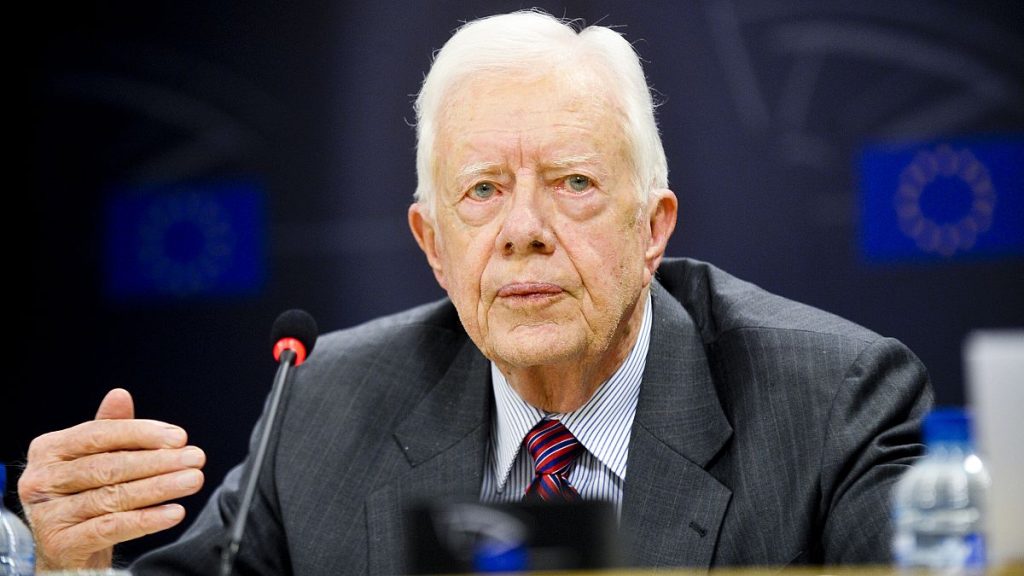Jimmy Carter, the 39th President of the United States, passed away at the age of 98, leaving behind a legacy deeply intertwined with transatlantic relations and a commitment to peace, human rights, and democracy. His death has evoked a wave of tributes from European leaders who recognize his significant contributions to global stability and the advancement of human dignity. From brokering peace in the Middle East to championing human rights on the global stage, Carter’s influence resonated far beyond American borders, shaping the political landscape of the late 20th century and inspiring generations of leaders.
Carter’s presidency coincided with a critical period of the Cold War, and his leadership proved instrumental in reinforcing the transatlantic alliance and bolstering Western unity against Soviet expansionism. He reaffirmed the United States’ commitment to NATO, emphasizing the importance of collective defense and urging European allies to strengthen their military capabilities. His focus was not on instigating conflict but on preserving peace through strength and unity, a message he consistently conveyed to European leaders throughout his tenure. This commitment to peace through strength was a recurring theme in his foreign policy, a strategy aimed at deterring Soviet aggression while simultaneously pursuing diplomatic solutions. His belief was that a robust defense posture was essential for maintaining peace and upholding the ideals of human rights that underpinned the Western alliance.
Beyond his strategic approach to the Cold War, Carter’s presidency was marked by his unwavering commitment to human rights. He made human rights a central pillar of his foreign policy, advocating for the oppressed and challenging authoritarian regimes worldwide. This emphasis on human rights resonated deeply in Eastern Europe, where his moral leadership put pressure on the Soviet Union and offered a beacon of hope to those living under communist rule. His vocal support for dissidents and his condemnation of human rights abuses contributed to the growing momentum for democratic change within the Soviet bloc. This focus on human rights was not merely a rhetorical stance; it was a core principle that guided his actions on the international stage.
European leaders have widely acknowledged Carter’s contributions, highlighting his dedication to peace, democracy, and human rights. Ursula von der Leyen, President of the European Commission, praised his “moral leadership” and his global impact on peace, health, and democracy. European Council President António Costa echoed these sentiments, describing Carter’s legacy as an inspiration, particularly his unwavering commitment to placing human rights at the center of his political life. European Parliament President Roberta Metsola hailed Carter as a “tireless champion for peace and human rights,” emphasizing his decisive role in resolving conflicts and earning the Nobel Peace Prize.
Tributes also poured in from individual European nations. French President Emmanuel Macron lauded Carter’s advocacy for the vulnerable and his tireless pursuit of peace. German Chancellor Olaf Scholz noted the world’s loss of a “great mediator for peace in the Middle East and for human rights.” British Prime Minister Keir Starmer emphasized Carter’s pivotal role in the Camp David Accords, a landmark achievement that brought peace between Israel and Egypt. Hungarian Prime Minister Viktor Orbán specifically highlighted Carter’s instrumental role in the return of the Holy Crown to Hungary, a symbolic act that resonated deeply with the Hungarian people and provided a glimmer of hope during a challenging period. Ukrainian President Volodymyr Zelenskyy acknowledged Carter’s support for Ukraine’s pursuit of freedom, recognizing the former president’s unwavering commitment to democratic values even before Ukraine’s independence.
These tributes reflect the profound impact Jimmy Carter had on international relations and his enduring legacy as a champion of peace and human rights. His presidency marked a crucial turning point in the Cold War, strengthening the transatlantic alliance and setting the stage for the eventual collapse of the Soviet Union. His unwavering commitment to human rights inspired generations of activists and leaders, contributing to a global shift towards greater respect for human dignity. Carter’s post-presidency work continued this dedication to service, highlighting his enduring commitment to making the world a better place. His life and legacy serve as a powerful reminder of the transformative power of moral leadership and the enduring importance of striving for a more just and peaceful world.














